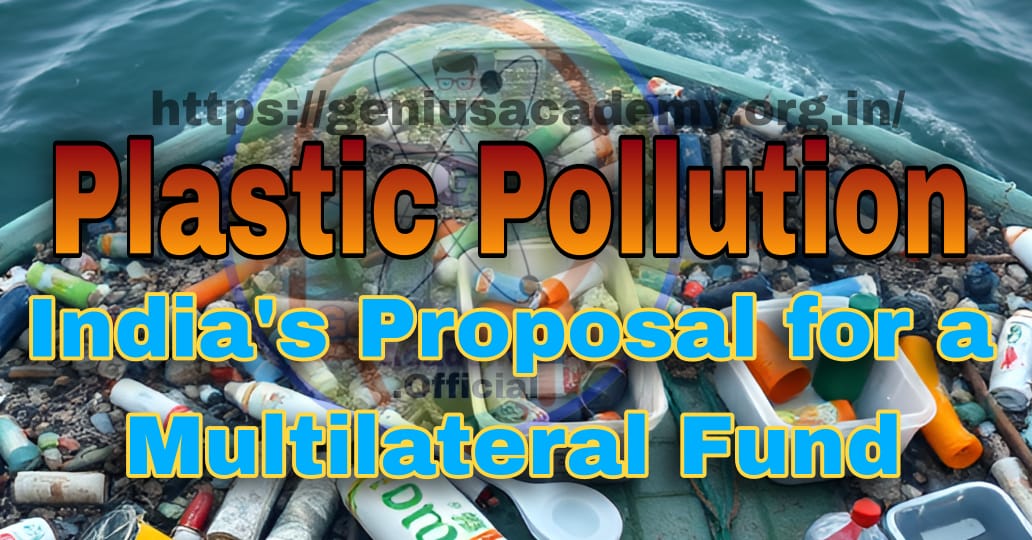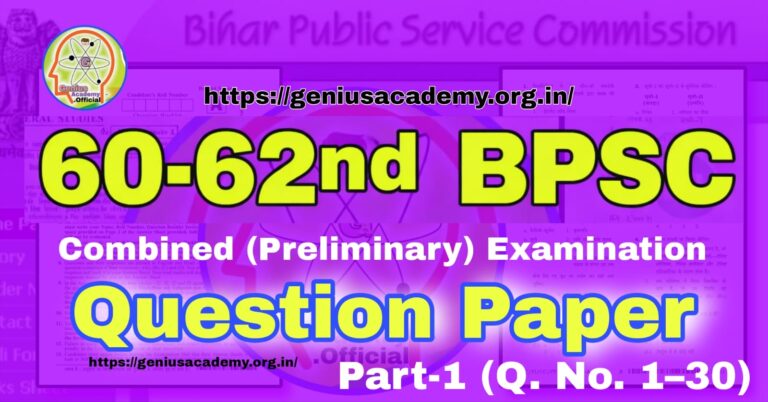Tackling Plastic Pollution: India’s Proposal for a Multilateral Fund
Introduction
Plastic pollution has emerged as a pressing global challenge, endangering ecosystems, human health, and biodiversity. Recognizing its urgency, the global community is working toward a legally binding treaty to address this issue. At the fifth session of the Intergovernmental Negotiating Committee (INC) in the Republic of Korea, India proposed the establishment of a dedicated multilateral fund to assist developing nations in combating plastic pollution. This proposal underscores the necessity of financial and technological support for achieving sustainable and equitable solutions to the plastic crisis.
Background of the Intergovernmental Negotiating Committee (INC)
What is the INC?
The Intergovernmental Negotiating Committee (INC) was established under the United Nations Environment Programme (UNEP) to negotiate a legally binding global treaty on plastic pollution. The INC seeks to devise actionable steps to curb the production, use, and disposal of plastics while addressing marine pollution and other environmental concerns.
- Objective: To develop a framework to significantly reduce plastic pollution by 2024.
- Global Participation: Over 170 countries are involved, including key players such as India, the United States, and China.
United Nations Environment Assembly (UNEA) Resolution 2022
In 2022, the United Nations Environment Assembly (UNEA) passed a resolution aimed at tackling plastic pollution globally. The resolution led to the creation of the INC, with an ambitious timeline to finalize a legally binding treaty by 2024.
- Key Highlights of the UNEA Resolution:
- Acknowledges the urgent need to address the full life cycle of plastics.
- Mandates reductions in plastic production and waste.
- Seeks to enhance international cooperation in plastic waste management.
Previous INC Sessions
The INC has already convened four sessions in Uruguay, France, Canada, and Kenya. Each session focused on specific aspects of the treaty, including:
- Binding limits on plastic production.
- Financial mechanisms to support implementation.
- Strategies for effective waste collection and recycling.
India’s Proposal for a Multilateral Fund
Key Objectives
India’s multilateral fund aims to ensure that developing nations receive the necessary financial and technological support to transition toward sustainable practices.
1. Grant-Based Financing:
- The fund will provide grants rather than loans, easing the financial burden on developing nations.
- These grants would facilitate the adoption of eco-friendly technologies and systems.
2. Equal Representation:
- Governance of the fund will include equal representation from developed and developing nations.
- A dedicated subsidiary body will manage fund operations, policies, and resource allocation.
3. Technology Transfers:
- The fund would oversee the transfer of cutting-edge technologies for waste management and recycling to developing countries.
- This would help bridge the technological gap between nations.
4. Periodic Replenishment:
- Developed nations will be obligated to periodically replenish the fund.
- Contributions will be assessed based on the “polluter pays“ principle, with greater accountability for high-pollution nations.
5. Private Sector Participation:
- The fund will have provisions to accept private contributions, broadening its resource base.
- This flexibility would enable collaboration with corporations and non-governmental organizations.
Challenges Addressed by the Multilateral Fund
1. Financial Constraints in Developing Nations
Plastic pollution disproportionately affects developing nations, which often lack the financial resources to implement sustainable waste management systems. The multilateral fund would:
- Help build infrastructure for waste segregation, collection, and recycling.
- Provide financial assistance for policy development and public awareness campaigns.
2. Technological Gaps
Many developing countries struggle with outdated or non-existent waste management technologies. The fund would promote:
- Access to advanced technologies such as pyrolysis for plastic-to-fuel conversion.
- Development of scalable solutions tailored to local needs.
3. Global Inequities in Plastic Pollution
Developed nations are responsible for a significant share of plastic waste. India’s fund proposal ensures that:
- High-pollution countries contribute fairly to global mitigation efforts.
- Resources are distributed equitably among nations based on their needs and capacities.
Global Context: Negotiations and Challenges
Key Points of Debate in the INC
- Binding Limits vs. Voluntary Actions:— Nations are divided on whether to impose binding limits on plastic production or adopt voluntary, country-specific measures.
- Chemical Restrictions:— Discussions include potential bans on harmful chemicals used in plastic production.
- Funding Mechanisms:— The allocation and governance of financial resources remain contentious, with developing nations advocating for grant-based support.
Marine Pollution
Plastic waste is a major contributor to marine pollution, with devastating impacts on marine life and ecosystems. A robust global treaty must address:
- Reduction in single-use plastics.
- Improvement in coastal waste management.
Role of Developed Nations
As primary contributors to plastic pollution, developed nations bear greater responsibility. The proposed fund aligns with the polluter pays principle, holding these nations accountable for their environmental impact.
India’s Stand on Plastic Pollution
Domestic Efforts
India has implemented several initiatives to curb plastic pollution, such as:
- Plastic Waste Management Rules, 2016:— Mandates extended producer responsibility (EPR) for managing plastic waste.
- Ban on Single-Use Plastics:— Introduced in 2022 to phase out disposable plastic items.
- Swachh Bharat Abhiyan:— Encourages waste segregation and recycling at the community level.
Global Leadership
India’s proposal for a multilateral fund highlights its proactive approach to global environmental governance. By advocating for financial and technological equity, India positions itself as a leader in sustainable development.
Proposed Solutions to Plastic Pollution
1. Reducing Plastic Production
- Transitioning to alternative materials such as bioplastics and biodegradable polymers.
- Promoting product redesign to enhance reusability and recyclability.
2. Strengthening Waste Management Systems
- Building efficient waste collection infrastructure in urban and rural areas.
- Investing in advanced recycling technologies.
3. Enhancing Public Awareness
- Educating communities about the environmental and health impacts of plastic pollution.
- Encouraging behavioral changes to reduce plastic consumption.
4. Policy Innovations
- Implementing strict regulations on plastic imports and exports.
- Introducing incentives for businesses adopting eco-friendly practices.
Conclusion: Toward a Sustainable Future
India’s proposal for a dedicated multilateral fund at the INC represents a significant step toward equitable and effective global action on plastic pollution. However, the success of such initiatives depends on collective will, technological innovation, and robust governance.
The global plastics treaty must go beyond addressing pollution to focus on:
- Reducing unnecessary plastic production.
- Promoting circular economy principles.
- Empowering vulnerable communities to participate in sustainable practices.
By adopting a holistic approach, the international community can combat plastic pollution and ensure a healthier, more sustainable planet for future generations.
Daily Mains Practice Questions
UPSC (CSE) Mains Questions on Plastic Pollution: India’s Proposal for a Multilateral Fund 2024
General Studies Paper 2 (Governance, International Relations, and Social Justice)
| [Q1.] Discuss the role of the United Nations Environment Programme (UNEP) and the Intergovernmental Negotiating Committee (INC) in addressing the global challenge of plastic pollution. Highlight the significance of India’s proposal for a multilateral fund in this context. (250 words) |
| [Q2.] How does India’s stance on establishing a multilateral fund to combat plastic pollution reflect its leadership in global environmental governance? Examine its alignment with the principles of equity and sustainable development. (250 words) |
| [Q3.] Analyze the key challenges in negotiating a legally binding global treaty on plastic pollution. Discuss the potential implications of limiting plastic production on developing and developed nations. (250 words) |
General Studies Paper 3 (Environment and Ecology, Science and Technology)
| [Q4.] Plastic pollution is a major contributor to environmental degradation and marine ecosystem collapse. Discuss the measures needed to reduce plastic waste and enhance global recycling capabilities. (250 words) |
| [Q5.] Highlight the role of technology in addressing the challenges of plastic waste management. Suggest innovative solutions for sustainable plastic disposal and recycling. (250 words) |
| [Q6.] Critically evaluate the need for international financial mechanisms, such as the multilateral fund proposed by India, to address global environmental challenges like plastic pollution. (250 words) |
FAQs on Plastic Pollution: India’s Proposal for a Multilateral Fund
1. What is the purpose of the Intergovernmental Negotiating Committee (INC)?
Answer:—
The INC was established under UNEP to develop a legally binding global treaty aimed at tackling plastic pollution. Its objective is to address the entire lifecycle of plastics, from production to waste management, and to propose actionable measures by 2024.
2. What are the key elements of India’s multilateral fund proposal?
Answer:—
- Grant-Based Support:— Providing financial grants to developing countries to transition to sustainable practices.
- Equal Representation:— Balanced governance between developed and developing nations.
- Technology Transfers:— Facilitating access to advanced waste management technologies.
- Private Funding:— Accepting private sector contributions under agreed modalities.
3. Why is a global treaty on plastic pollution important?
Answer:—
A treaty ensures coordinated international action to combat plastic pollution. It sets binding targets for reducing production, promotes the use of alternative materials, and facilitates financial and technological support for countries most affected by pollution.
4. What challenges are involved in negotiating the global treaty?
Answer:—
- Differing priorities between developed and developing nations.
- Resistance to binding limits on plastic production.
- Disagreements over funding mechanisms and financial obligations.
5. How does plastic pollution affect marine ecosystems?
Answer:—
Plastic waste, particularly microplastics, harms marine species, disrupts food chains, and degrades water quality. It leads to biodiversity loss and economic challenges for coastal communities relying on fisheries and tourism.
6. What measures are needed to address plastic pollution in India?
Answer:—
- Strengthening enforcement of the Plastic Waste Management Rules.
- Encouraging the adoption of biodegradable alternatives.
- Promoting extended producer responsibility (EPR).
- Enhancing public awareness and behavioral change campaigns.








Hello guys!
I came across a 151 interesting page that I think you should visit.
This platform is packed with a lot of useful information that you might find insightful.
It has everything you could possibly need, so be sure to give it a visit!
[url=https://geniusacademy.org.in/set-30-quarterly-ca-2025-jan-to-march/]
Furthermore don’t forget, everyone, that one at all times may within the publication find solutions for the most confusing questions. The authors attempted to present all data using the most extremely accessible way.